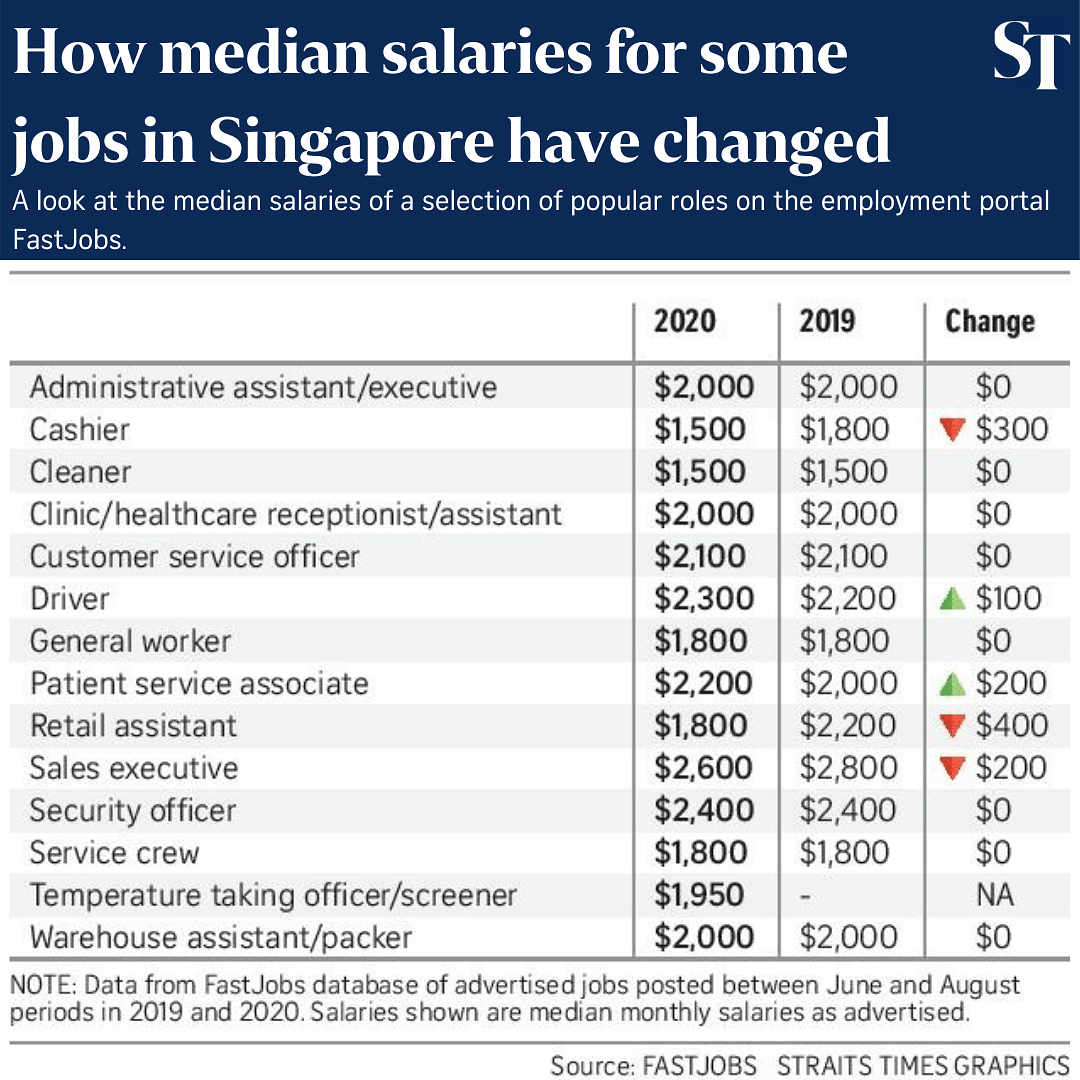COVID-19 SPECIAL
Job seekers in Singapore willing to accept lower pay as Covid-19 pandemic hits hard
Experts: They are more flexible amid tight labour market, difficult economic conditions
Sign up now: Get ST's newsletters delivered to your inbox

A survey in June and July found that over 50 per cent of respondents were willing to take on jobs with a lower salary.
ST PHOTO: KUA CHEE SIONG
Follow topic:
Former manager Lau Disan was doing well before the pandemic hit, but she has had to take a 50 per cent pay cut after switching from the ravaged retail industry to early childhood education.
Her experience is far from rare: Many job seekers are now willing to accept lower salaries because of the tight employment market and difficult economic conditions brought on by the coronavirus, experts said.
Ms Lau, 46, was a retail manager for 15 years in the jewellery trade and earned over $4,000 a month. Now, she is a trainee childcare educator at Kinderland earning half that.
But she said the pay cut was acceptable because she is still undergoing training under a Professional Conversion Programme for pre-school teachers.
"I have zero prior experience in early childhood education," she noted. "In order to get into the industry, I have to lower my expectations, accept that I am learning from scratch and start afresh.
"I benefit from working half a day, and training to gain a professional diploma at the same time. It is a win-win for employees and employers."
She added that she also sees it as an opportunity to further her education while having a job and feeding her family.
A Randstad Singapore survey in June and July found that over 50 per cent of respondents were willing to take on jobs with a lower salary.
Randstad managing director for Malaysia and Singapore Jaya Dass said: "It is clear that the majority of companies have implemented some levels of cost-cutting measures this year.
"(Therefore) those who've been retrenched or who are at heightened risk of having their job scope changed significantly are voluntarily revising their salary expectations when looking for a new employer."

She added that job seekers should not just focus on salary or bonuses. "As long as the remuneration is fair and matches their expectations, candidates should also try to consider the other benefits, such as healthcare and work-from-home allowances."
Nearly 50 per cent of 373 respondents in a poll conducted by employment portal FastJobs in late August also said they were open to taking positions offering less than their last salary.
It found that 39 per cent could stomach a drop of up to $200 a month, while 19 per cent were even open to accepting a fluctuation of $1,000 or more.
FastJobs general manager Lim Huishan said: "Generally, people are more flexible with salaries now as they recognise that it's difficult to get a job and also that in trying out a new industry, taking less pay than their last (salary) may be necessary as their previous experience is not as relevant.
"There are also factors like age and personal commitments that affect their willingness to take lower pay in exchange for flexibility."
Data from the platform showed that retail assistant was one of the roles with the greatest salary fluctuation in the period June to August, compared with the same period last year, with the median pay dropping $400.
Cashiers' median salary dropped by $300, while sales executives saw a dip of $200.
But the median salary of drivers increased by $100 and that of patient service associates went up by $200.
Adecco country manager for Singapore Betul Genc noted that candidates for sales and marketing positions would accept an average pay reduction of 5 per cent while job seekers for white-collar roles in supply chain and engineering are open to a cut of 10 per cent in exchange for stability and security.
But other industries might actually see base salaries rise.
Manufacturing firms, for example, had to attract local talent in the interim to replace workers from Malaysia when border restrictions kicked in.
Workers in sectors such as technology, healthcare and life sciences, accounting and finance, and some sales and marketing roles also might expect salary hikes, said Ms Genc.
ManpowerGroup Singapore country manager Linda Teo agreed that salaries have increased in sectors with growing business demands, such as in pharmaceuticals, but pay for jobs in tourism and hospitality has dropped.
Salaries in the oil and gas sector have taken a hit as well due to the decline in air travel, she noted.
Ms Teo said: "Job seekers with niche skill sets highly sought after in the market continue to expect a higher pay but are more willing to negotiate the increment percentage.
"Meanwhile, candidates who are applying for corporate or rank-and-file roles are more flexible as there is more competition for those jobs."
A spokesman for the Institute for Human Resource Professionals noted that mid-career switchers who have gone through past economic downturns may expect lower salaries than what they received at their previous jobs.
Job seekers should stay resilient and flexible, viewing their career as a long-term investment, Ms Genc advised.
"While the salary might be slightly lower, the job will help you re-enter the workforce as quickly as possible, ride you out of the crisis, and professionally, there may be other learning and development opportunities within the organisation."
She added that job seekers can prioritise the learning experience as well. "We would also encourage being open to opportunities even if it is a temporary or contract role, as it helps with gaining new skills and experience. The longer a job seeker remains out of work, the lower the bargaining power."

